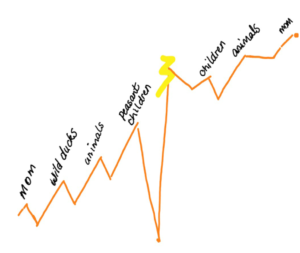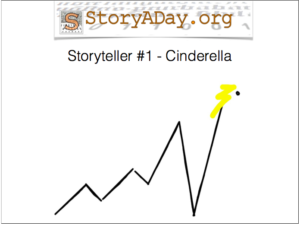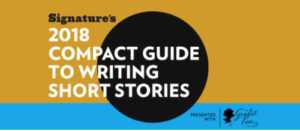Here we are: the last day!
Today I’m sharing the final Superstar post with everyone, because I think everyone needs to take a moment to celebrate!!
Audio only
Transcript
I hope that you have found this illuminating, frustrating, exhilarating…
I know there were days when you weren’t thrilled with what you write and that there were days when you surprised yourself or made yourself really happy.
More than that, YOU know that you have 31 days under your belt, of writing whether you felt like it or not.
(Even if you didn’t write every day, I’m willing to be there were days this month when you wrote when you didn’t want to and you finished a story even when you thought it wasn’t worth it and that act of finishing showed you that you can do this.)
You’ve pushed yourself and I want you to take some time today to make some notes about what you’ve learned, about your rhythms of writing; about how things work for you.
I can give you advice, and Stephen King can give you advice, and none of it really matters. It’s great to put yourself in a community of people talking about things that matter to you, and you can learn from other people’s examples, for sure, but the only way to discover how you write, is to write.
At the end of this 31 days, you’ll have learned something about your rhythm, your practice of writing.
The Prompt
Write a story about a creative person who has just completed, or is in the throes of completing a massive creative effort.
(And yes, this can be autobiographical).
Youc ould tak us thorugh the manic process of trying to finish up the work. You can show us their post-event hysteria/collapse. You can have them reflecting on the effort.
Pay attention to the physicality of it.
Go anywhere you want with this.
It doesn’t have to be serious. It can be self-indulgent (you’ve earned it!)
Looking Backwards And Looking Forwards
I hope this has been a great experience for you.
Write your story today and then take a moment to blog or journal or tweet or whatever you do to celebrate and share.
Take some time to really revel in the fact that you have devoted these 31 days, regardless of how much you were able to turn up, or how often you were able to write, or how good your stories were, you devoted this month to paying attention to your inner writer.
You have these materials now, you can come back at any time and dive back into these prompts, the meditations, the forum. You’ve met these people who have gone through this experience with you and you’ve made some connections. I hope you will stay in touch with each other. Having a cohort of people to help each other out is an amazing thing. These people who know and like you will be your biggest boosters, so stay in touch. Take advantage of the fact that you have this group of people how have shared this experience with you.
(And if you weren’t part of the Superstars group this time around, keep watching your inbox for the next opportunity. I’ll be running this again in September and next May, at the very least.)
Make your plans for the rest of the year. As you’re writing your celebratory blog/journal entry and going through the worksheet about what you’ve learned this month, think about your plans are for the rest of the year, the rest of the next five years…
Think about how you can put into practice. everything you’ve learned in this month to honor your urge to write to be creative, to write. If you need to be part of a group of people who commit to writing regularly, then you’re going to need to find a group. It might be the SWAGr group–come along on the first of the month, and make sure you’re on the SWAGr notifications list by signing up at the bottom of this page. Maybe you need a real-life group fo people who meet in a cafe on Saturday mornings and does a write-in. Find one. Look on Meetup.com. Start one!
Whatever you need, figure it out, commit to doing it.
Set yourself some goal. Make most of them attainable, but think about having one big, scary, outrageous goal. Think about the steps you can take to get yourself closer to realizing that goal, or at least working towards it.
Thank you for coming along on this journey. I learn a lot from you, and from producing these materials, so I really appreciate you being here. I love getting to know you and building this tribe of people who are on each other’s side as we strive to be writers everyday, not ‘someday’.
Write your story today. Journal about your experiences this month. Watch your inbox for more information from me in the months ahead, and most of all…
Keep writing!!
And don’t forget to sign up to receive reminders about the Serious Writers’ Accountability Group (SWAGr) below!
What are your plans for the months ahead? What would you like to see here at StoryADay to help you reach your goals? Leave a comment (or a link to your blog post) below.


 Today’s bonus prompt comes from Elise Holland, writer and editor of the 2Elizabeths online literary magazine
Today’s bonus prompt comes from Elise Holland, writer and editor of the 2Elizabeths online literary magazine


 Jen Silverman is a New York–based writer and playwright, a two-time MacDowell Fellow, and the recipient of a New York Foundation for the Arts grant and the Yale Drama Series prize. She was awarded the 2016–17 Playwrights of New York fellowship at The Lark and is a member of New Dramatists. She completed a BA in comparative literature at Brown University and an MFA in playwriting at the Iowa Playwrights Workshop, and was a fellow at the Playwrights Program at Juilliard.
Jen Silverman is a New York–based writer and playwright, a two-time MacDowell Fellow, and the recipient of a New York Foundation for the Arts grant and the Yale Drama Series prize. She was awarded the 2016–17 Playwrights of New York fellowship at The Lark and is a member of New Dramatists. She completed a BA in comparative literature at Brown University and an MFA in playwriting at the Iowa Playwrights Workshop, and was a fellow at the Playwrights Program at Juilliard.